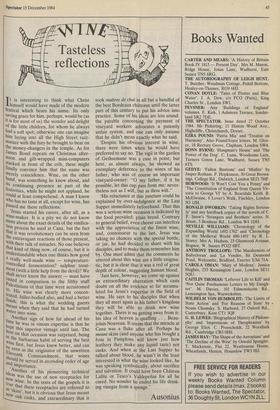Tasteless reflections
It is interesting to think what Christ himself would have made of the modern festival which bears his name. Its only saving grace for him, perhaps, would be (as it is for most of us) the wonder and delight of the little children, for whom he always had a soft spot; otherwise one can imagine him laying into all the High Street razz- matazz with the fury he brought to bear on the money-changers in the temple. As for James Bond repeats on Christmas after- noon and gift-wrapped mini-computers stacked in front of the crib, these might finally convince him that the name was merely coincidence. Wine, on the other hand, was something he knew about, and Its continuing presence as part of the festivities, while he might not applaud, he Could at least comprehend. A man I know who has no taste at all, except for wine, has Passed me these reflections: :Jesus started his career, after all, as a Wine-maker. It is a pity we do not know More about the exact details of the vindica- tion process he used at Cana, but the fact that it was revolutionary can be seen from the extravagant reactions of those present, with their talk of miracles. No one believes that kind of thing now, of course, but it is understandable when one thinks how good a really well-made wine — temperature- controlled fermentation? sulphur treat- ment (with a little help from the devil)? We shall never know the answer — must have Lasted in comparison to the filthy stuff ,Palestinians of that time were accustomed `°. His wine was clearly more concen- It'ated, fuller-bodied also, and had a better tinish: this is what the wedding guests Meant when they said that he had turned Water into wine. Another sign of how far ahead of his Luine he was in vinous expertise is that he tePt this superior vintage until last. The ost on that occasion was surprised, being in the barbarous habit of serving the best bwIne first, but Jesus knew better, and can seen as the originator of the unwritten sc.leventh Commandment, that wines Ilould be served in ascending order of age dri,c1 importance. Another of his pioneering technical "oleas was the use of new receptacles for ,u_ew wine. In the texts of the gospels it is "ril,e that these receptacles are referred to skins', but it is obvious that Jesus meant "ew oak casks, and extraordinary that it
took maltres de chai in all but a handful of the best Bordeaux châteaux until the latter part of this century to put his advice into practice. Some of his ideas are less sound: the parable concerning the payment of vineyard workers advocates a patently unfair system, and one can only assume that he didn't mean exactly what he said.
'Despite his obvious interest in wine, there were times when he would have preferred to say no. The vigil in the garden of Gethsemane was a case in point; but here, as almost always, he showed an exemplary deference to the wines of his father, who was of course an important vineyard-owner: "0 my father, if it be possible, let this cup pass from me: never- theless not as I will, but as thou wilt."
'His reluctance at this juncture could be explained by over-indulgence at the Last Supper immediately beforehand. That this was a serious wine occasion is indicated by the food provided: plain bread. Contrary to general belief, even cheese can interfere with the appreciation of the finest wine, and, connoisseur to the last, Jesus was taking no chances with the special bottle, or jar, he had decided to share with his disciples, and to make them remember him by. One must admit that the comments he uttered about this wine are a little enigma- tic, but it is clear that it was a red of great depth of colour, suggesting human blood.
'Just here, however, we come up against an extraordinary aberration which casts doubt on all the evidence so far accumu- lated for Jesus's expertise in the field of wine. He says to his disciples that when they all meet again in his father's kingdom they will be able to drink new wine together. There is no getting away from it: his idea of heaven is quaffing . . . Beau- jolais Nouveau. It seems that the miracle at Cana was a fluke after all. Perhaps he meant skins (and anyone who has bought a bota in Pamplona will know just how leathery they make any liquid taste) not casks. And when at the Last Supper he talked about blood, he wasn't in the least interested in what the wine looked like, he was speaking symbolically, about sacrifice and salvation. It could have been Château Lafite or Tesco's Valdepenas for all he cared. No wonder he ended his life drink- ing vinegar from a sponge.'
Ausonius


















































 Previous page
Previous page